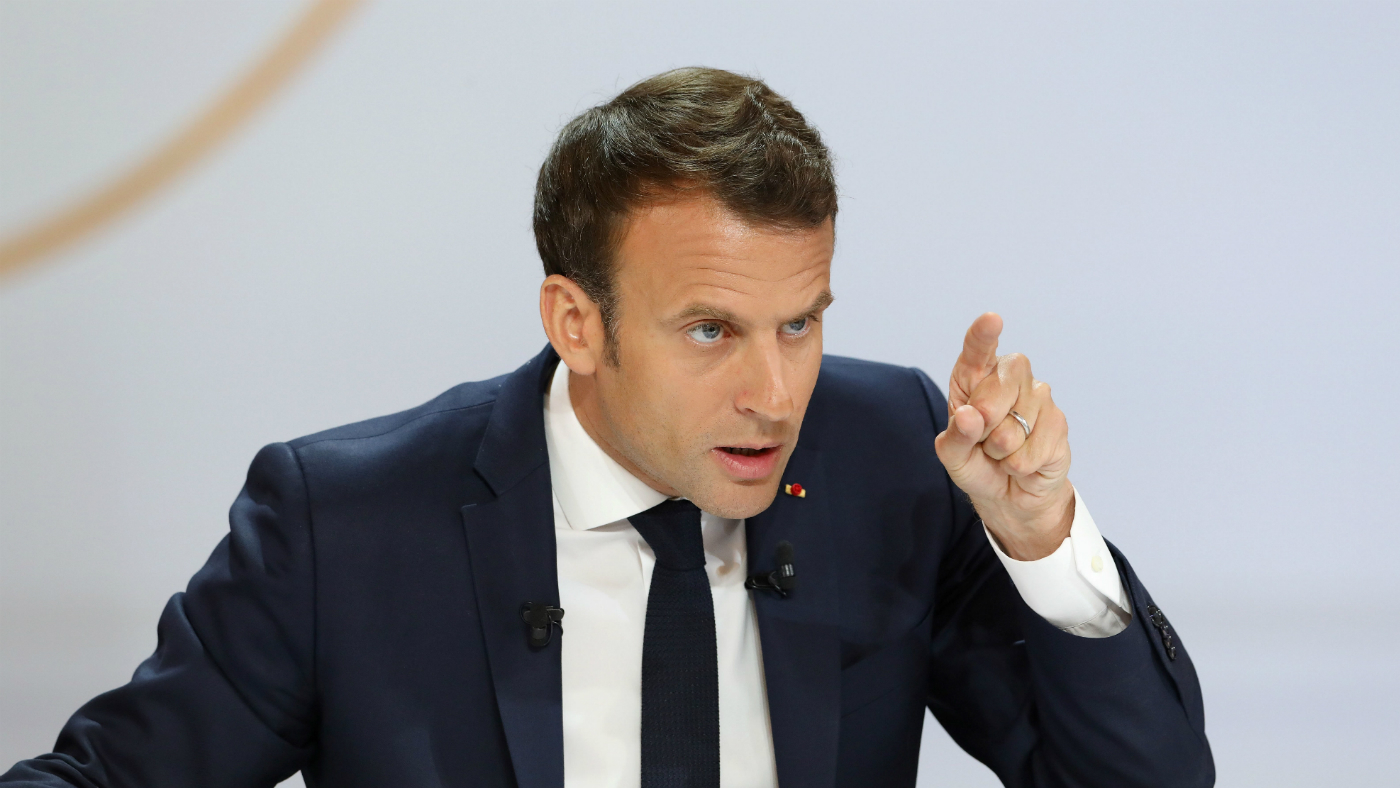Emmanuel Macron’s plan to end gilets jaunes protests
French president offers €5bn in tax cuts for lower earners but activists rubbish attempts at compromise

A free daily email with the biggest news stories of the day – and the best features from TheWeek.com
You are now subscribed
Your newsletter sign-up was successful
French President Emmanuel Macron is hoping to quell civil discontent led by the so-called “gilet jaunes” (yellow vests) protesters by promising large tax cuts, higher pensions and civil service reform.
Speaking at a news conference in Paris on Thursday, he said that public order must be restored following months of demonstrations. But despite his apparent olive branch, the French leader also vowed to stay the course with his polarising policies.
The “sometimes violent” nationwide protests have been held every week since November, and were sparked by rises in fuel costs but have “widened to cover a range of grievances over economic inequality”, the BBC reports.
The Week
Escape your echo chamber. Get the facts behind the news, plus analysis from multiple perspectives.

Sign up for The Week's Free Newsletters
From our morning news briefing to a weekly Good News Newsletter, get the best of The Week delivered directly to your inbox.
From our morning news briefing to a weekly Good News Newsletter, get the best of The Week delivered directly to your inbox.
At the peak of the gilets jaunes unrest - so called because protesters wear fluorescent yellow high-vis jackets - an estimated 285,000 people took to the streets across France.
In his televised addressed, dubbed his “moment of truth” by French media, Macron acknowledged that many French citizens were feeling “anger and impatience for change”, and said he accepted the protesters’ “just demands”.
The country is facing a significant “lack of trust” in the Establishment, he said - an apparent nod to recent opinion polls that show Macron’s approval rating has halved from 60% at his inauguration two years ago to around 30% today.
In a gesture designed to “assuage” the protesters, the president pledged €5bn (£4.3bn) worth of cuts to income tax for those on low or medium incomes, and pension rises for the poorest, CNN reports. And he promised that no more schools or hospitals would be closed during his presidency.
A free daily email with the biggest news stories of the day – and the best features from TheWeek.com
But he also criticised the gilet jaunes demonstrators, saying their campaign had been marred by episodes of anti-Semitic violence, attacks on journalists and homophobia.
Macron insisted that he would not reverse his controversial decision to scrap the country’s wealth tax, a move that helped spark the unrest and earned him the less-than-complimentary nickname of “president of the rich”, says The Guardian.
Instead, he added, he would continue with his project to liberalise the French economy and overhaul its welfare state.
“The transformations that are in progress and the transformations that are essential for our country should not be stopped,” Macron said. “I asked myself, ‘Should we stop everything that was done over the past two years? Did we take a wrong turn?’ I believe quite the opposite.”
One solution to the nation’s problems was for its people to work harder, he argued.
“We must work more,” he said. “France works much less than its neighbours. We need to have a real debate on this.”
According to The Times, a yellow-vest spokesperson has “dismissed his measures as meaningless”, while the opposition Socialist Party said: “Once again, Emmanuel Macron is asking workers to make an effort but at no time is he asking for an effort from people who earn millions.”
-
 How the FCC’s ‘equal time’ rule works
How the FCC’s ‘equal time’ rule worksIn the Spotlight The law is at the heart of the Colbert-CBS conflict
-
 What is the endgame in the DHS shutdown?
What is the endgame in the DHS shutdown?Today’s Big Question Democrats want to rein in ICE’s immigration crackdown
-
 ‘Poor time management isn’t just an inconvenience’
‘Poor time management isn’t just an inconvenience’Instant Opinion Opinion, comment and editorials of the day
-
 Greenland’s capital becomes ground zero for the country’s diplomatic straits
Greenland’s capital becomes ground zero for the country’s diplomatic straitsIN THE SPOTLIGHT A flurry of new consular activity in Nuuk shows how important Greenland has become to Europeans’ anxiety about American imperialism
-
 Epstein files topple law CEO, roil UK government
Epstein files topple law CEO, roil UK governmentSpeed Read Peter Mandelson, Britain’s former ambassador to the US, is caught up in the scandal
-
 Iran and US prepare to meet after skirmishes
Iran and US prepare to meet after skirmishesSpeed Read The incident comes amid heightened tensions in the Middle East
-
 Israel retrieves final hostage’s body from Gaza
Israel retrieves final hostage’s body from GazaSpeed Read The 24-year-old police officer was killed during the initial Hamas attack
-
 China’s Xi targets top general in growing purge
China’s Xi targets top general in growing purgeSpeed Read Zhang Youxia is being investigated over ‘grave violations’ of the law
-
 Panama and Canada are negotiating over a crucial copper mine
Panama and Canada are negotiating over a crucial copper mineIn the Spotlight Panama is set to make a final decision on the mine this summer
-
 Why Greenland’s natural resources are nearly impossible to mine
Why Greenland’s natural resources are nearly impossible to mineThe Explainer The country’s natural landscape makes the task extremely difficult
-
 Iran cuts internet as protests escalate
Iran cuts internet as protests escalateSpeed Reada Government buildings across the country have been set on fire